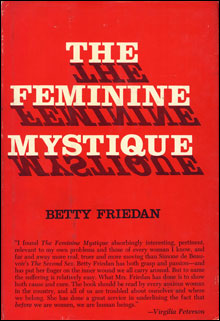 Last spring I taught a course called “Beatniks, Hot Rods, and the Feminine Mystique: Sex and Gender in 1950s Films” at Dartmouth College. It was a First Year Seminar, and all the students were 18 years old, born in 1987. For them the 1950s were ancient history. Many had never even seen a black-and-white film.
Last spring I taught a course called “Beatniks, Hot Rods, and the Feminine Mystique: Sex and Gender in 1950s Films” at Dartmouth College. It was a First Year Seminar, and all the students were 18 years old, born in 1987. For them the 1950s were ancient history. Many had never even seen a black-and-white film.
When I realized just how distant the ’50s were to these students, I began to fret about our first reading for the course, the first three chapters of Betty Friedan’s groundbreaking The Feminine Mystique
— published in 1963 but really an examination of women in the previous decade. Would they find Friedan’s early second-wave feminism cranky and whiny? After all, many students, even female students, are resistant to feminist complainers: “Just do what you want to do and stop bitching about it...” is a common response to much feminist writing.
But I need not have worried. They came to class loving Friedan. They found the book compelling, well-written, and tinged with crackling irony. They also found Friedan’s arguments — and this really surprised me — pertinent to their own lives. Friedan’s astute, savagely humorous critique of how women’s magazines dictated the terms of many female lives rang true, and they were impressed how true it remained for young women today. When Friedan wrote about women’s complicated relationship to higher education — college and grad school were fine, as long as they eventually led to marriage and children — the women in my class saw themselves dealing with the mixed messages of 2005 that demanded they be educated yet reproductively marriageable. The men in the class also related to Friedan’s argument that happy 1950s suburbia was predicated on both female acquiescence and male overachieving.
Underscoring the breadth of her analysis, Friedan’s book was brilliantly illustrated by almost all the films we watched, from All About Eve and The Big Heat to Imitation of Life and The King and I. Time and again students would turn to her to discuss the films: “Anna is like a 1950s housewife with an impossible husband who just happens to be the king of a country.”
But the most evocative aspect of The Feminine Mystique for my students was Friedan’s term “the problem that has no name.” Friedan used the phrase to describe how the oppression of post-war women was simply unspeakable — impossible even to articulate. But as the students read more of Friedan’s book and began looking at other major concerns of the 1950s — the cold war, sexual subversion, gender dysphoria, crumbling national identity — they always went back to Friedan: the problem that has no name. And indeed, it is a phrase that strikes at the heart of the complicated, barely articulated uneasiness of the 1950s. The power of The Feminine Mystique is that it started the feminist revolution. Its genius is that it articulated and explicated the fears and anxieties of a decade, one that launched our own time.